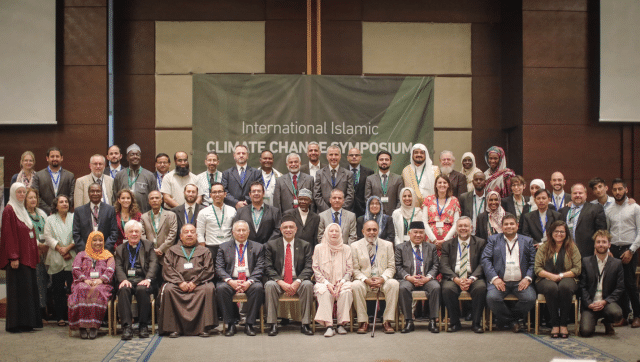A symposium of Islamic leaders from 20 different countries meeting in Istanbul today released a Climate Change Declaration that presents the moral case for the world’s 1.6 billion Muslims to “tackle habits, mindsets, and the root causes of climate change, environmental degradation and the loss of biodiversity.”
The declaration calls for world governments to adopt an agreement in Paris during UN climate talks to be held this December that would phase out fossil fuels and limit global warming to 1.5 to 2 degrees Celsius.
It was drafted by an international team of Islamic scholars and has already been endorsed by a number of prominent Muslim scholars and teachers, as well as high-ranking officials including the Grand Muftis of Uganda and Lebanon.
Not only does the declaration urge a rapid phase-out of fossil fuels, it calls for a switch to 100 percent renewable energy and specifically lays out a deadline of 2050 for wealthy and oil-producing nations to phase out all greenhouse gas emissions.
Like many religious leaders calling for climate action, the Islamic leaders who penned the declaration present it as a moral necessity that we switch to clean energy and increase support for poor, marginalized communities that are already suffering disproportionately from impacts of climate change such as drought, flooding and hunger.
“Excessive pollution from fossil fuels threatens to destroy the gifts bestowed on us by God, whom we know as Allah – gifts such as a functioning climate, healthy air to breathe, regular seasons, and living oceans,” they write. “But our attitude to these gifts has been short-sighted, and we have abused them. What will future generations say of us, who leave them a degraded planet as our legacy? How will we face our Lord and Creator?”
These Islamic leaders join a growing chorus of religious leaders not just calling for climate action but casting efforts to deal with global warming and the impacts it will have, especially on the world’s poor, as a moral imperative.
Pope Francis released a Papal Encyclical on climate change in June, presenting a moral case for humanity’s responsibility to “protect our common home” by tackling climate change and poverty, which he views as the two major global crises of our time. “[T]he earth herself, burdened and laid waste, is among the most abandoned and maltreated of our poor,” the Pope wrote.
The Holy See also specifically called for a phase-out of fossil fuels: “There is an urgent need to develop policies so that, in the next few years, the emission of carbon dioxide and other highly polluting gases can be drastically reduced, for example, substituting for fossil fuels and developing sources of renewable energy.”
The Dalai Lama has also frequently spoken of the need for action on climate change, linking it to the need for reforms to the global economic system:
Since climate change and the global economy now affect us all, we have to develop a sense of the oneness of humanity.
— Dalai Lama (@DalaiLama) June 15, 2015
Earlier this year, Katharine Jefferts Schori, presiding bishop of the US Episcopal church, called denial of climate science immoral: “I think it is a very blind position. I think it is a refusal to use the best of human knowledge, which is ultimately a gift of God.”
Schori added: “It is certainly a moral issue in terms of the impacts on the poorest and most vulnerable around the world already.”
Image Credit: Islamic Relief
Subscribe to our newsletter
Stay up to date with DeSmog news and alerts







